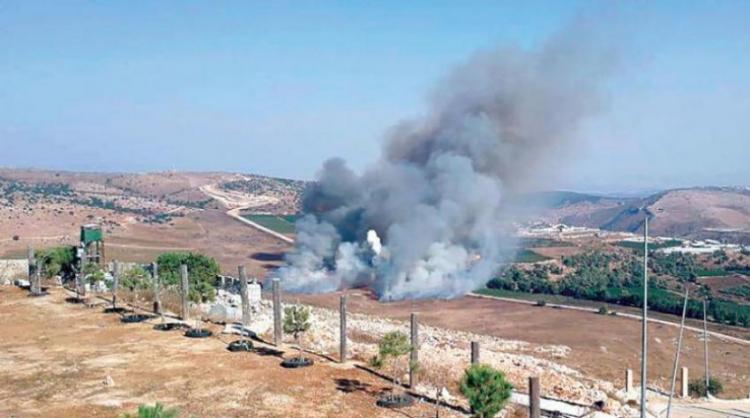Strategic expert: Russian advancement reduced the presence of Hezbollah in Syria
Northern Syria – North-Press Agency
The retired brigadier and military and strategic expert Naji Mala’eb told North-Press that things are no longer in the hands of Hezbollah and Iran despite the use of security paper to improve their presence in Syria, and that “there is no direct impact as long as all forces are fighting in Syria”.
Naji Mala’eb said that Hezbollah’s presence in Syria isn’t as dense as it was in the past, and that the reason for that presence started to be limited, as Russia advanced and started training the Syrian government army, which limited the controlled areas by the Iranian-backed groups in Syria.
He added that the initial agreement which was reached between the US, Russian and Israeli national security advisers about Syria, will take a practical course, and therefore things are no longer in the hands of Hezbollah and Iran, despite their use of the security paper to improve their presence inside Syria.
He also said that the Syrian government decisions in the region are now in the hands of Russia, which has respected Israeli national security through the Israeli air strikes in coordination with the Russians.
It also showed the extension of this compatibility with the U.S. in Iraq against the stored missiles of Popular Mobilization Units (PMU). The strategic expert pointed out that “there is no direct impact as long as all forces are fighting inside Syria”.
He also stressed that “Israel has obtained Russia’s approval by conducting flights and destroying Hezbollah’s missiles, besides to what happened in Lebanon won’t affect this reality”.
“The U.S. strike against al-Qaeda’s hideouts in Idlib region won’t affect Russia, where there is a direct coordination, because Russia’s airspace can only be penetrated after the announcement of the joint operating room”, as he said.
The statement which was issued by the Russians is “to save the face towards Syria, and this has no significant importance”, while he pointed out that the air strike is a joint US-Russian message to Turkey, because Turkey didn’t abide by Sochi agreement regarding the cease-fire, and it didn’t implement what it had promised about reducing al-Qaeda’s presence in northwestern Syria.
Regarding the stance of the European countries, the military and strategic expert confirmed that the stance of the European countries is only helpful for the U.S., and that because Lebanon is concerned with this issue, Europe can intervene “in order to ease the issue, and not to end it because the Israeli decision is in the hands of the Americans”.
Mala’eb considered that what happened by Hezbollah, is a response to the penetration on the Lebanese scene, and this isn’t the first time where Israeli fighter jets raid on Hezbollah’s military positions, and today’s response was because it had targeted a square in a southern suburb in Beirut.
He explained that there are entitlements which prevent responding before the Israeli elections, and there is also a fear whether, after the elections, the Lebanese scene will be open to offensives or not, and it is dealt with such as the Israeli dealings with Syria and Iraq, there is also a risk of direct retaliation until Israel achieves its political aspirations.
He also sees that Israel’s goal of this tension is both political and economic, because it hasn’t been able to start producing gas yet, because it fears of Hezbollah’s rockets, unless there is a commitment not to attack the installations it intends to establish on the coast between southern Lebanon and Israel.
“All this confusion is to reach a political stance with a pledge by the Lebanese and Israeli sides to start gas extraction”, he concluded.
On Sunday, Hezbollah announced the destruction of an Israeli military vehicle near the southern borders of Lebanon. While Israel said it had responded to the attack by firing on the southern areas of Lebanon.
The Lebanese Hezbollah had confirmed the destruction of an Israeli military vehicle in Avivim area, near the southern borders of Lebanon, resulting in human casualties.
Hezbollah’s response comes a week after it had accused Israel of launching a twin-drone, which attacked its stronghold near Beirut, which it had previously killed two of its members in an attack in Syria.
Israel, for its part, announced that it had responded to the firing at the southern areas of Lebanon after firing counter-tank missiles at its territories.

